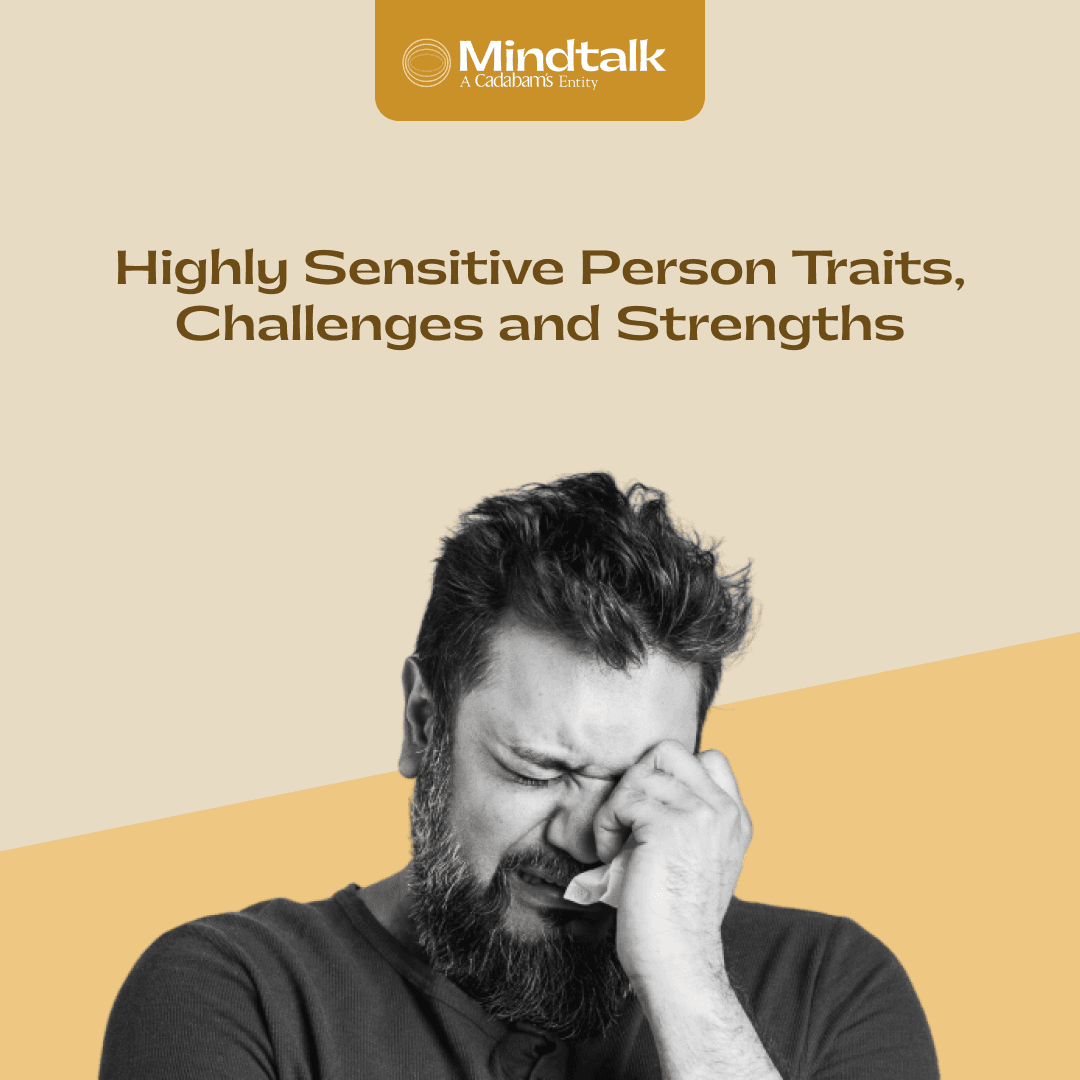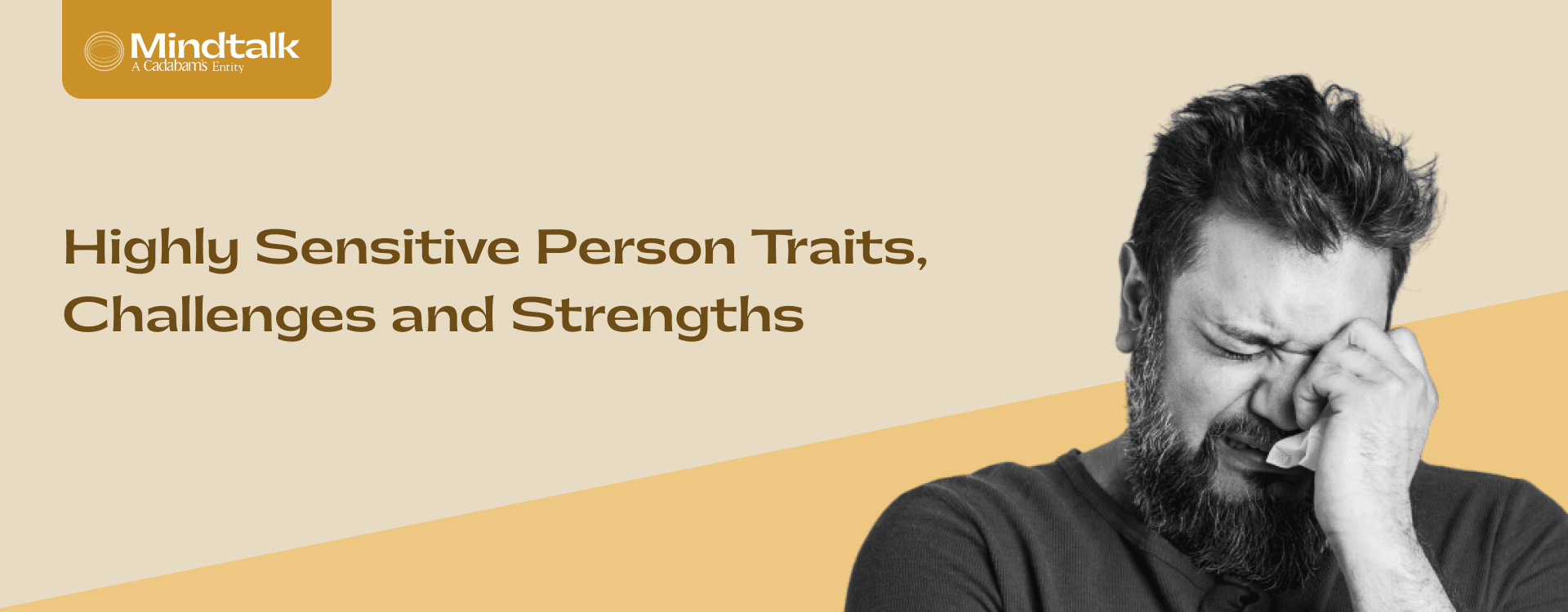Traits, Challenges, And Strengths Of Highly Sensitive People

“Stop being so sensitive” is something you’ve heard either directed at you or someone around you. Despite experiencing sensitivity ourselves and meeting people who are relatively sensitive, there are several misconceptions about what makes a sensitive person.Let us explore the complexities faced by people with highly sensitive traits and how they can be harnessed into positive outcomes.
What Is A Highly Sensitive Person (HSP)?
A highly HSP or Highly Sensitive Person, is a specific, neurodivergent individual, who typically experience increased sensitivity to physical stimuli such as noise, smell and sound as well as intense reactions to emotional and social stimuli. They are affected more deeply by sensory input or information, and susceptible to being overwhelmed quickly. Before you consider self-examining, remember that being able to be sensitive is different from being a HSP.
The Science Behind Sensitivity
There is no one exact source for sensitivity and how it manifests itself in a person. Instead, it is a series of biological and environmental factors that constitute the scientific basis for understanding HSPs. Neurological differences, including characteristics of the amygdala can impact one’s sensitivity. Genetic factors can also influence how the nervous system can heighten or reduce sensitivity.
Common Characteristics Of Highly Sensitive People
High sensitivity is a dynamic trait and can broadly apply to different categories. That said, scientists suggest that there are several traits or characteristics common to HSP. Some of these include heightened emotional awareness and perception, and inclination towards overstimulation.
Their heightened sensitivity to physical stimula extends to emotional subtleties, aesthetics, and other aspects of the environment, often making them appreciate art or nature more than the average person. They are also known to have deep empathy and enhanced creative instincts.
Causes of Highly Sensitive Personality
Getting to the root of your increased sensitivity isn’t the easiest, as it is a mix of evolutionary factors, your social environment, genetics, and even childhood experiences. Since sensitivity is not new to living beings, it is essential to understand our sensitive tendencies within the context of our experiences and mental wellbeing. Some of the common causes include:
Anxiety
Anxiety is a common contributor to HSP traits as it increases sensitivity of the nervous system, potentially from a young age. If you are prone to anxiety, there is an increased likelihood of a highly active amygdala which creates intense reactions to emotional stimuli. Dealing with anxiety symptoms as restlessness can worsen your ability to contain your responses to external stimuli over time, creating a chain of heightened sensitivities.
Trauma
Trauma can shape your brain’s response to stressors by sensitizing the nervous system. Similar to anxiety, past traumatic experiences trigger the amygdala, leading to it being hyperactive. This creates intense reactions to anything seemingly dangerous or potentially threatening. A HSP may also process sensory information on a more detailed level, due to their experience in dealing with traumatic events.
Dopamine
Dopamine is a crucial neurotransmitter that is associated with feelings of pleasure, reward and good mood. Dopamine imbalances, whether it arises as a result of genetic, neurological or lifestyle factors can affect the way you respond to stimuli. Excess dopamine, for example, may amplify emotional and sensory experiences and can potentially influence the development of traits associated with HSP.
Key Traits Of Highly Sensitive Persons
Now that you have a clearer understanding of what may cause high levels of sensitivity, let us understand the characteristics traits in a HSP. These can help us navigate our own varying levels of sensitivities, but empathize with those around us.
Emotional Depth And Empathy
Highly sensitive persons are known to possess profound emotional depth, which enables them to connect with others on a personal level. Heightened sensitivities often lead to heightened empathy. This allows them to cultivate nuanced understanding of emotions, often making them more compassionate and supportive.
Sensitivity To External Stimuli
A bustling environment can be overwhelming for HSPs. With increased sensitivity to sounds, lights, textures and social interactions mixed with it, their experiences feel more intense compared to non-HSPs. This often requires mindful adjustments to personal and social spaces for individuals to cope with sensitivity better.
Creative And Intuitive Insights Of HSP
HSPs are primed to discern subtle details from various forms of art, allowing them to connect better with creative aspects of the world. Due to their sensitive nature, they are often more intuitive, sparking creativity and innovation. They are known for their imagination and are often great contributors to art, theater, poetry and more.
Challenges Faced By Highly Sensitive Individuals
While harnessing the potential positives of high sensitivity can provide some benefits to everyday life, HSPs often face hurdles in multiple aspects of life, often leaving them stressed and susceptible to mental health concerns.
Easily Overwhelmed
When a highly sensitive person experiences a flood of stimuli, it can overwhelm them and lead to emotional exhaustion. This is exacerbated when you already find it difficult to manage your boundaries and allow for unfiltered stimuli to affect you on a regular basis.
Shyness And Social Anxiety
Besides the fact that social experiences are more likely to trigger stimuli in a sensitive person, these individuals are likely to be aware of their triggers surrounding social events, which puts them under further pressure. To an extent, they anticipate social anxiety, but don’t always have the tools to prepare for it. This makes them shy, awkward and difficult to engage with, in a social setting.
Anxiety And Depression
Being sensitive is normal and valid, but to those who experience high sensitivity, it feels like the bane of their existence. The reduced ability to manage their sensitivity, which subsequently leads to restrictions in lifestyle choices and activities, can cause immense sadness and anxiety, in some cases causing depression.
Work Stress And Challenges
Work environments are notorious for being highly stimulating, with excessive noise and pressure. While this can be a challenge for anyone, HSPs may struggle with maintaining their concentration and productivity in a sea of triggers. They may also find it challenging to cope with criticism or high-pressure situations, leading to heightened stress levels. They also need more time than others to reflect and rewind, which is not always possible in a demanding work environment.
Strengths And Advantages Of Being Highly Sensitive
Being highly sensitive isn’t without its strengths, and being able to use that to your advantage, in relationships, professional life or personal development.
Enhanced Empathy And Understanding
Heightened stimuli has shown to create heightened empathy, which is a common theme among HSPS. They have the ability to create strong bonds and be a pillar of support to their friends and loved ones. They are great listeners and have the ability to understand others on a deeper level than most, allowing them to form long-lasting relationships.
Creative And Artistic Abilities
While heightened stimuli isn’t always welcome by those with high sensitivity, it does come with the benefit of being able to notice subtleties in things quickly. They observe and analyze artistic components on a deeper level, and are known for being outside-the-box thinkers. HSPs are well tuned to take up artistic and innovative endeavors.
Deep Processing And Thoughtfulness
HSPs engage in deep, reflective thinking, offering unique perspectives. Their thoughtfulness contributes to thorough decision-making and a nuanced understanding of complex issues.
Managing Stress As A Highly Sensitive Person
In most cases, avoiding stimuli is difficult, almost impossible. Managing its effects, however, is possible. With the right kind of management strategies, a HSP can minimize the impact that sensitivity can have on their lives.
Add Positivity
Cultivating positivity is akin to an antidote to problems created by sensitivity. While you may not be able to control that aspect of life, you can create this sense of counter balance by focusing on your own strengths and achievements in personal and professional life. Positive affirmations can go a long way in building resilience and maintaining direction in an otherwise disruptive life.
Avoid Stressors
While stimulants themselves are hard to avoid, some stimulants are more stress inducing than others and can be dealt with to some extent, in advance. One way to achieve this is by creating a calm and relaxing environment whenever possible and making a conscious effort to not to be exposed to external stressors.
Set Up A Safe Space
Your safe space is something that allows you to recharge and rejuvenate after a long day. This private space is something you can design that is stimuli and stress free, helping you maintain emotional and mental balance.
Guidance For Thriving As A Highly Sensitive Person
Managing stress is one thing, but a HSP can absolutely go beyond that and live a life of fulfillment and joy. Here are some ways you can thrive as a HSP
Adjust Your environment
You are what you are surrounded by and tailoring your environment to accommodate sensitivity can significantly change the way you function. From lighting to noise levels, small adjustments can create a more comfortable and supportive environment, helping you focus on your goals without sensory overload.
Practice Acceptance And Mindfulness
The first step towards a fulfilling life as a HSP is embracing your sensitivity. Identify your triggers, understand what makes you feel calm and practice appropriate mindfulness strategies. With this self acceptance, you can follow it up with meditation and other relaxation activities that can help manage emotional responses and promote inner calm.
Choose Loved Ones Wisely
While you may not get to decide exactly who we interact with on a daily basis due to professional and family commitments, you can certainly determine how close you let someone get to you, in life. Build relationships with people who understand your challenges and are empathetic. Surrounding yourself with people who respect your sensitivities and stressors can make a huge difference to the quality of your life.
How Mindtalk Helps To Overcome A High Sensitive Personality Issues
High Sensitive Personality issues aren’t uncommon, but due to its very nature, it can be incredibly difficult to manage it on your own. If your sensitivity is overwhelming you to a point where everyday life, professional work and personal relationships are affected, reach out to a mental healthcare expert at Mindtalk. Our professionals with years of experience guiding those with high sensitivity are best equipped to provide support and advice on how to regulate your sensitivities and lead a lead of control and satisfaction. Give us a call today: +91 7353400999.
Mental Health Professional For Personality Disorder












